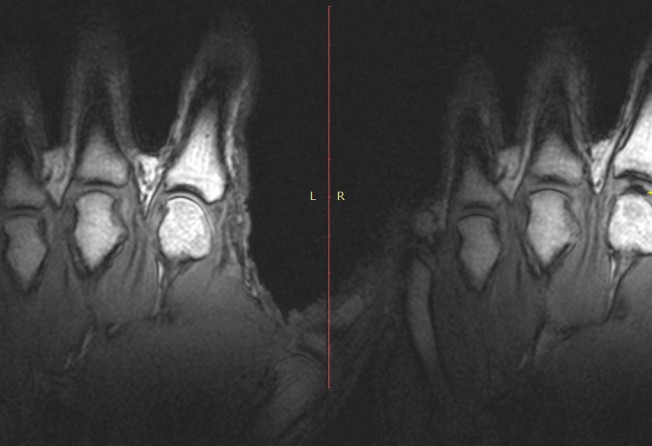Does knuckle cracking cause arthritis?

Pop quiz: does knuckle cracking cause arthritis? Scientists have calculated that the amount of force at work when you crack your knuckles has enough energy to cause damage to hard surfaces, yet studies show that the habit does not appear to cause long-term harm.
Scientists in Canada have taken a step closer to an answer by discovering what exactly happens when a knuckle is cracked that causes the distinctive popping sounds.
Through magnetic resonance imaging (MRI) video, the University of Alberta researchers observed that the cause is a cavity forming rapidly inside the joint.
"By defining the process underlying joint cracking, its therapeutic benefits, or possible harms, may be better understood," write the international team of researchers in their study published last week in PLOS ONE.
The researchers found a subject, a local chiropractor named Jerome Fryer, who had the ability to not only crack the knuckles in every finger, but also do it repeatedly after a short rest period.
Fryer's fingers were inserted one at a time into a tube connected to a cable that was slowly pulled until the knuckle joint cracked. MRI video captured each crack in real time - occurring in less than 310 milliseconds.
In every instance, the cracking and joint separation was associated with the rapid creation of a gas-filled cavity within the synovial fluid, a super-slippery substance that lubricates the joints.
"It's a little bit like forming a vacuum," says lead author Greg Kawchuk, a professor in the Faculty of Rehabilitation Medicine. "As the joint surfaces suddenly separate, there is no more fluid available to fill the increasing joint volume, so a cavity is created and that event is what's associated with the sound."
The researchers also observed the presence of a white flash that appears just before cracking. Kawchuk believes it is water suddenly being drawn together just before the joint cracks.
Scientists have debated the cause of joint cracking for decades, dating back to 1947 when British researchers first theorised vapour bubble formation as the cause. In the 1970s, another team of scientists instead pointed to collapsing bubbles as the cause.
In 1998, a Californian doctor, Donald Unger, reported the results of a 50-year self-controlled study during which he cracked the knuckles of his left hand at least twice daily, and never cracked those on his right.
Writing in a letter to the editors of the journal Arthritis & Rheumatism, Unger said he had no arthritis in either hand, and no apparent differences between the hands.
"The ability to crack your knuckles could be related to joint health," says Kawchuk, who believes this work could have implications for other joints in the body, including the spine, and help explain why joints become arthritic or injured.
He plans to use even more advanced MRI technology to understand what happens in the joint after the pop, and its health implications.
"It may be that we can use this new discovery to see when joint problems begin long before symptoms start, which would give patients and clinicians the possibility of addressing joint problems before they begin," says Kawchuk.